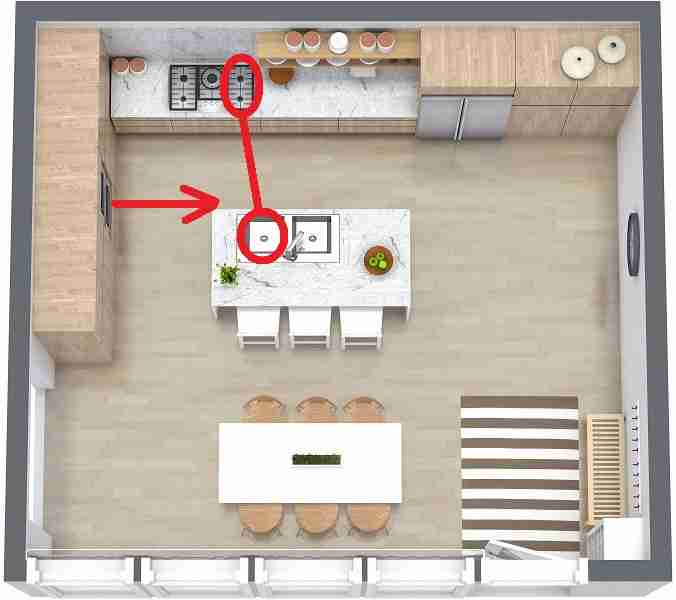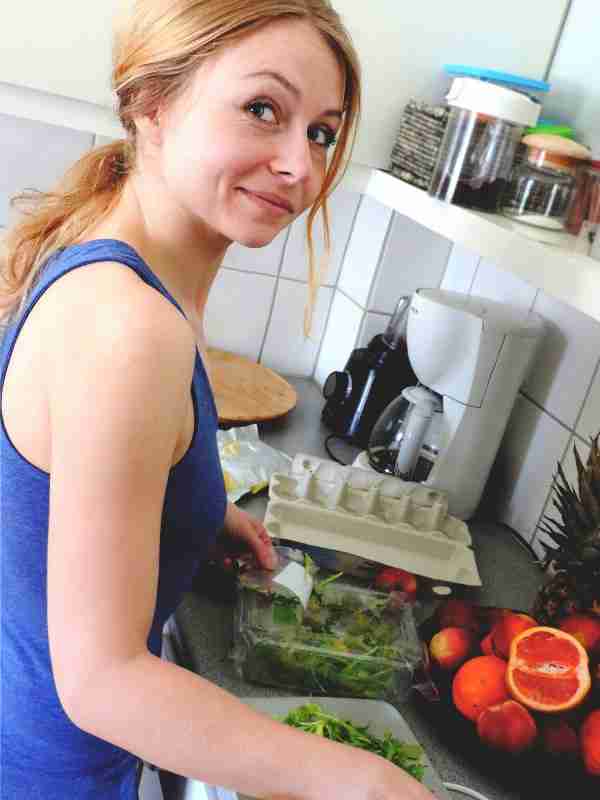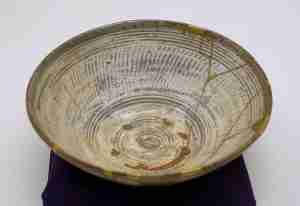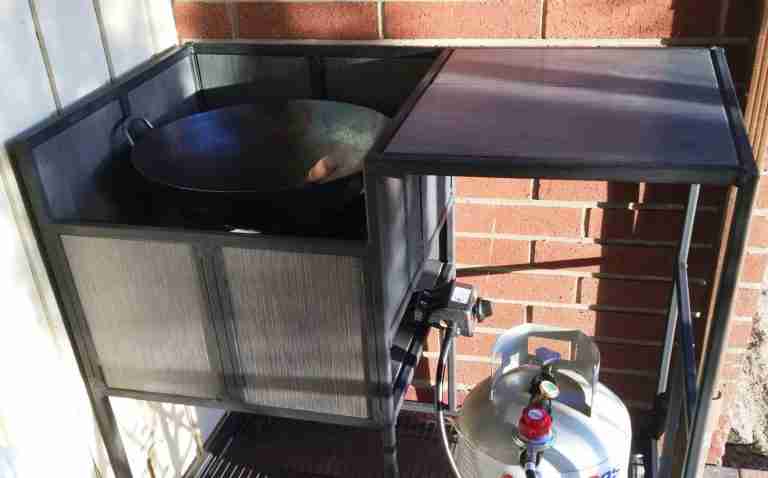The Internet's Top 10 Feng Shui Kitchen Tips
[REVIEWED]
Are you a passionate cook? Do you enjoy experimenting in the kitchen and making tried-and-true favorites for your friends and loved ones?
If you love food, you understand the importance of a functional and comfortable kitchen. But what you might not know is that you can improve your cooking experience with Feng Shui. A correctly set up Feng Shui kitchen makes cooking more enjoyable and the results more successful.
But what is Feng Shui, exactly? Feng Shui is an ancient Chinese art that involves arranging buildings, furniture, and decor to enhance energy flow and improve balance and harmony.
According to Feng Shui, the layout and design of your kitchen effects a lot more than just the food you prepare. It can have an impact on everything from your health to your financial wellbeing!
Internet search results seem to list the same Ten easy Feng Shui kitchen tips over and over. Keep reading below for Feng Shui expert Dean French’s opinion on each tip. You’ll learn what optimizing your kitchen the traditional Feng Shui way means.
Here are the Internet’s top ten tips for creating good kitchen Feng Shui design that we'll be reviewing:
- Mindful Stove and Sink Placement.
- Deep clean and De-clutter.
- Pick the Right Colors.
- Use Good Lighting.
- Replace Broken Items.
- Personalize Your Kitchen and Stove.
- Don’t Burn Your Home’s Heart.
- Keep the Kitchen in the Back.
- Pay Attention To Lo Shu Directions.
- Mindful Mirror Placement.
Tip #1: Mindful Stove and Sink Placement
The internet says: “When you’re thinking about how to Feng Shui your kitchen, you should pay special attention to your stove and sink. Your stove represents the resources and nourishment that you have in your life. The sink and its faucet, on the other hand, can have an impact on your energy and health. For obvious reasons, your stove is a fire element and your sink is a water element. You should avoid placing your stove and sink directly across from or next to each other. This will keep these elements from clashing.”
Dean Says: This is a good “back to basics” tip where we simply look at the interplay of Elements. From a practical standpoint, it can be difficult to achieve in small spaces while in large kitchens, the wider distance between the stove and sink can help reduce any negative effects.

If we take it a step further we can be more precise. If you use the tap and drain as your reference (not the whole sink), you can pick exactly which burners to avoid, and which ones to use. Putting the plug in the sink will also help. In the example on the left, one sink is almost aligned to the burners and it is closest to the wall oven. Avoiding this sink will help prevent the Fire-Water clashing.
Tip #2: Deep clean and De-clutter
The internet says: “As you’re researching how to Feng Shui kitchen areas, you’ll quickly learn that cleanliness is essential. Don’t let piles of dirty dishes stack up, and keep cleaning supplies like dishrags, mops, and cleaning solution bottles stored out of sight. Keep your refrigerator and pantry organized and keep pantry doors closed. When it comes to kitchen storage and cleanliness, good Feng Shui often overlaps with good safety practices. For example, a Feng Shui kitchen shouldn’t have sharp knives on display or left out in the open.”
Dean Says: I usually roll my eyes when it comes to calling decluttering Feng Shui, however for Feng Shui in the kitchen, I have to agree with this premise, simply for safety’s sake.
Displaying expensive knives is a modern decorative trend that is traditionally frowned upon in Chinese culture as it represents cutting of relationships, and why knives are never given as gifts.
A Feng Shui reason is that sharp knives represent Geng Yang Metal and the kitchen is a Fire area, displaying knives can create a Metal vs Fire clash, particularly harmful for the Father. More on this in Tip #9.
In essence, a clean kitchen is a healthy kitchen and can only improve your home’s overall good Feng Shui.
Tip #3: Pick the Right Colors
The internet says: “Color has a big impact on the mood of any room. White is a great choice for a Feng Shui kitchen because it is clean and represents purity. It is a good way to offset the bright colors of fruits, vegetables, and other food items that you keep in the kitchen. Your specific color choices can also be personalized to fit the mood you want to cultivate in your kitchen. In Feng Shui, different colors represent different elements and have different benefits. You can opt for fire colors like red and orange if you want to enhance inspiration and passion in your kitchen. Go for an earth color like brown or yellow for nourishment or a wood color like green for growth. Water colors like black and dark blue can enhance wisdom and community, and a metal color like gray could bring you enhanced precision and joy in the kitchen.”

Dean Says: In general, the only part of this tip I would disagree with is using Metal and Water colors – unless it’s exceptional circumstances, and usually it’s only to help bring the Cycle of Elements back to a balanced state. You can take your color selection further by using directions and Feng Shui schools such as Flying Stars or Yuen Hom.
Tip #4: Use Good Lighting
The internet says: “Bright lighting in your kitchen creates good energy. Try LED lighting for a brighter look, and avoid overhead fluorescents when possible. You should also make sure that you have enough light to work safely and comfortably in your kitchen. In this room, practicality and safety should be top priorities.”
Dean Says: This Feng Shui tip is really a safety rule that we all should follow. Since the kitchen is considered a Yang room in the house, it does make sense from a Feng Shui perspective to have a bright, well-lit kitchen as well.
Tip #5: Replace Broken Items
The internet says: “Broken items correlate with broken energy. They can bring bad luck into your life, so it’s best to part with items that have become cracked or chipped.”
Dean Says: I personally feel that this popular tip places too much emphasis on purchasing new things, and just feeds into the consumerist society we have. I’m far more in favor of repair and re-use as much as possible, not only in the kitchen.

If you’ve broken an extra-special kitchen utensil, you can try repairing it with the Japanese kintsugi method. This involves using lacquer and precious metals to piece broken items back together. Rather than attempting to hide flaws, it celebrates them as a new facet of the item’s beauty.
Tip #6: Personalize Your Kitchen and Stove
The internet says: “There are many general Feng Shui guidelines that you can follow when planning your kitchen. However, it’s also important to personalize your home according to your individual Ming Gua. Your Gua number helps identify personal characteristics that can guide the Feng Shui decisions you make. Kitchen layout and stove placement can be personalized to fit your Gua, your individual needs, and the Feng Shui of your house.”
Dean Says: This tip appears in 50% of the internet’s top results when you search for “Feng Shui kitchens”, but it’s kind of a nothing tip.
The most important part of the kitchen for Ming Gua’s and 8 Mansions isn’t the location of the room, but of the stove and the direction the oven door is pointing towards. In Flying Stars you would like a good Mountain Star like the 9 Fire. You can use your BaZi Chinese Astrology to locate the stove in a position that will boost your Best Element (Yong Shen in Chinese).
This is great if you are designing a new home or renovating your kitchen, but if not then you will have to work out what type of Feng Shui remedy you can use to boost the positive Chi and reduce the negative.
Tip #7: Don’t Burn Your Home’s Heart
The internet says: “In life, the kitchen is regarded as the heart of the home. In Feng Shui the center is considered the heart of the home. Because your kitchen is (literally!) filled with fire, placing it at the center of your home is like attacking the heart of your home. That’s why Feng Shui best practices suggest that your kitchen is not centrally located.”
Dean Says: Traditional Chinese homes are square in shape, with a garden in the center usually open to the sky. This serves a practical purpose in crowded towns and cities, giving the family a private space to relax and connect with nature.
In Feng Shui the center represents a space and ‘not a space’ at the same time. It is an infinitesimal point that affects the entire building.
It is affected by the Annual Flying Stars, for example the 2023 Northwest star is the 5 Earth, widely regarded as the Disaster Star. Fire destroys Metal in the Cycle of Elements, so anyone with a kitchen in the Northwest of their home in 2023 could be creating constant disasters for themselves depending on the exact locations of the stove and oven.
I follow this popular Feng Shui tip myself, it is a good one.
Tip #8: Keep the Kitchen in the Back
The internet says: “In ancient China, the kitchen was considered a place of abundance and wealth. To protect this wealth, it’s generally believed that it’s best to keep the kitchen towards the back of the house. Too close to the front door and your family’s wealth and prosperity will leak right out!”
Dean Says: I actually think this is more of a practical kitchen tip than a Feng Shui one. Even today, many Chinese prefer to do their cooking outside the home on gas burners. If you think about it, traditional stoves were wood or charcoal burning, which produces smoke as well as cooking smells so it makes sense to cook separately from the house.

In modern homes, from the back of the house you can watch your children play through the windows and all the cooking and food preparation smells can exit through the back rather than filling the house so it also makes sense to follow this tip.
Tip #9: Pay Attention To Lo Shu Directions
The internet says: “Your kitchen should not be located in the Northwest section of your house. This location is considered unlucky because it is said to negatively impact the patriarch of the family, who was traditionally considered the main breadwinner. It is best for the kitchen to be situated in the south or east sector of your home.”
Dean Says: This is a very ‘back to basics’ tip. In the Lo Shu the Northwest is Yang Metal and Qian Trigram which indeed represents the Father (or oldest male). Logically it does make sense – Fire melts Metal, so it could create problems. Similarly a kitchen in the West will also have a Fire v Metal clash, and the North will have Fire and Water clashing if we use the Lo Shu alone.
This is where the more advanced Feng Shui schools come into play. By using 8 Mansions, Ming Gua’s, Flying Stars and San Yuen Yuen Gua, you can work out what other energies are affecting the area and create a space using cures and remedies that supports the Father while also allowing room for good meals and healthy relationships.
I’ll take the opportunity here to point out that while the kitchen is important to most schools of Feng Shui, the landforms around the house and the flow of Chi through the house will have a stronger effect than the kitchens location in the Lo Shu Northwest.
Tip #10: Mindful Mirror Placement
The internet says: “This fairly popular tip says to place a mirror behind your stove to reflect the warmth and light that it emits. A mirror will also allow you to see behind you as you cook, which puts you in a position of power even when your back is to the rest of the room.”
Dean Says: In the many homes and kitchens I’ve seen over the past 20 years, I’ve never witnessed any with a mirror behind the stove burners.
Although this tip appears in 40% of Feng Shui kitchen search results, I feel that it is very impractical to have glass in an area where it could be easily smashed or broken. Commercial kitchens use tiles and stainless steel for a very good reason. This tip is one I would never consider just for safety.
Get Your Kitchen Feng Shui’d Today
With the tips above, you’ll be a lot safer when creating your culinary sanctuary. Make simple changes like cleaning, repairing and lighting to help safety and enjoyment but avoid bigger projects like adjusting your sink and stove with Feng Shui until you engage an expert consultant.
For the best Free stove placement Feng Shui tips, watch Master Edgar’s educational video based on traditional lineage teachings.
Feng Shui Resources
Learn the Ancient Chinese Arts of Feng Shui, Lunar Chinese Astrology, and Solar Chinese Astrology with Dean’s Comprehensive Bundle!
Get everything you need to start learning these ancient arts in one convenient bundle. This bundle includes detailed course notes and examples covering everything from the basics of Feng Shui to the more advanced concepts of Lunar Chinese Astrology and Solar Chinese Astrology.
They are clear, concise, and easy to follow, especially for beginners. You’ll learn everything you need to know to improve your life with the help of these ancient arts.
Limited time offer: Get a $150 bundle discount ($747 down to $597) when you purchase all three courses today!






